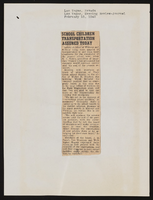Search the Special Collections and Archives Portal
Search Results
Marcia Washington oral history interview
Identifier
Abstract
Oral history interview with Marcia Washington conducted by Claytee D. White on February 14, 2013 for the African Americans in Las Vegas: a Collaborative Oral History Project. In this interview Marcia Washington discusses moving to Las Vegas, Nevada at age thirteen and only attending black only schools. She talks about fun times from her childhood, her family life after getting married in 1972, and becoming the first African American on the State Board of Education in 2000.
Archival Collection

Transcript of interview with Donald L. Shalmy by Stefani Evans and Claytee D. White, March 10, 2017
Date
Archival Collection
Description
Text

Meeting minutes for Consolidated Student Senate, University of Nevada, Las Vegas, May 24, 1974
Date
Archival Collection
Description
Text

Meeting minutes for Consolidated Student Senate University of Nevada, Las Vegas, August 22, 1994
Date
Archival Collection
Description
Text

Meeting minutes for Consolidated Student Senate, University of Nevada, Las Vegas, June 05, 2000
Date
Archival Collection
Description
Text

Abraham Gomez interview, December 6, 2019: transcript
Date
Archival Collection
Description
Interviewed by Elsa Lopez. Abraham Gomez is a College Navigator for the Nevada Treasurer's Office where he is responsible for providing and distributing information on post-secondary resources that may enable Nevadans to go to college. Gomez was born and raised in Las Vegas, Nevada and grew up on the East Side near Desert Pines High School. He received an Associate of Arts from the College of Southern Nevada before obtaining a bachelor's degree in Communication Studies from the University of Nevada, Reno. After graduating he worked as a GEAR UP Ambassador for Nevada State College where he advised a cohort of 46 low-income students on the importance of continuing their education. He has volunteered with various organizations throughout Southern Nevada and continues to work to better his community and make education accessible to students everywhere.
Text
Hazel Baker Denton Photograph Collection
Identifier
Abstract
The Hazel Baker Denton Photograph Collection (1910-1961) is comprised of photographic prints and one negative of the Denton family and friends, primarily taken in Nevada and Utah. Many photographs depict life in small Nevada towns, particularly Caliente. Photographs also depict Utah, Oregon, Washington D.C., and California, and unidentified desert and forest landscapes throughout the American West.
Archival Collection
Clark County Community College Photograph Collection
Identifier
Abstract
The Clark County Community College Photograph Collection consists of black-and-white photographic prints dating from approximately 1977 to 1982. Images depict students, student events, administrative staff, academic faculty, and administrative faculty, including two of the college's presidents, Dr. Russell Bloyer and Dr. Judith Eaton.
Archival Collection


